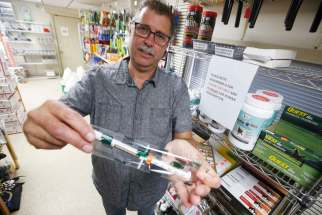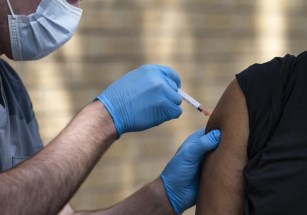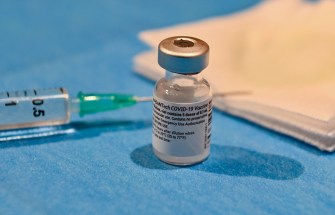Human demand for horse dewormer raises concerns
Read this article for free:
or
Already have an account? Log in here »
To continue reading, please subscribe:
Monthly Digital Subscription
$0 for the first 4 weeks*
- Enjoy unlimited reading on winnipegfreepress.com
- Read the E-Edition, our digital replica newspaper
- Access News Break, our award-winning app
- Play interactive puzzles
*No charge for 4 weeks then price increases to the regular rate of $19.00 plus GST every four weeks. Offer available to new and qualified returning subscribers only. Cancel any time.
Monthly Digital Subscription
$4.75/week*
- Enjoy unlimited reading on winnipegfreepress.com
- Read the E-Edition, our digital replica newspaper
- Access News Break, our award-winning app
- Play interactive puzzles
*Billed as $19 plus GST every four weeks. Cancel any time.
To continue reading, please subscribe:
Add Free Press access to your Brandon Sun subscription for only an additional
$1 for the first 4 weeks*
*Your next subscription payment will increase by $1.00 and you will be charged $16.99 plus GST for four weeks. After four weeks, your payment will increase to $23.99 plus GST every four weeks.
Read unlimited articles for free today:
or
Already have an account? Log in here »
Hey there, time traveller!
This article was published 16/09/2021 (1547 days ago), so information in it may no longer be current.
Strict warnings not to ingest horse dewormer haven’t deterred some Manitobans from seeking out agricultural doses of the drug.
Last week, a man showed up at a veterinary centre outside Winnipeg, intent on buying ivermectin, which, through the spread of misinformation, has been falsely stated to cure COVID-19.
Last month, an Anola business began putting up cautionary signs to ward off frequent customer inquiries; other feed supply stores have been fielding multiple calls.
Manitoba’s poison control centre hasn’t flagged an increase in reports of ivermectin exposure, but health officials say they know people are taking the medication to treat symptoms of COVID-19 — even though it poses real dangers and there is no evidence it is effective against the novel coronavirus.
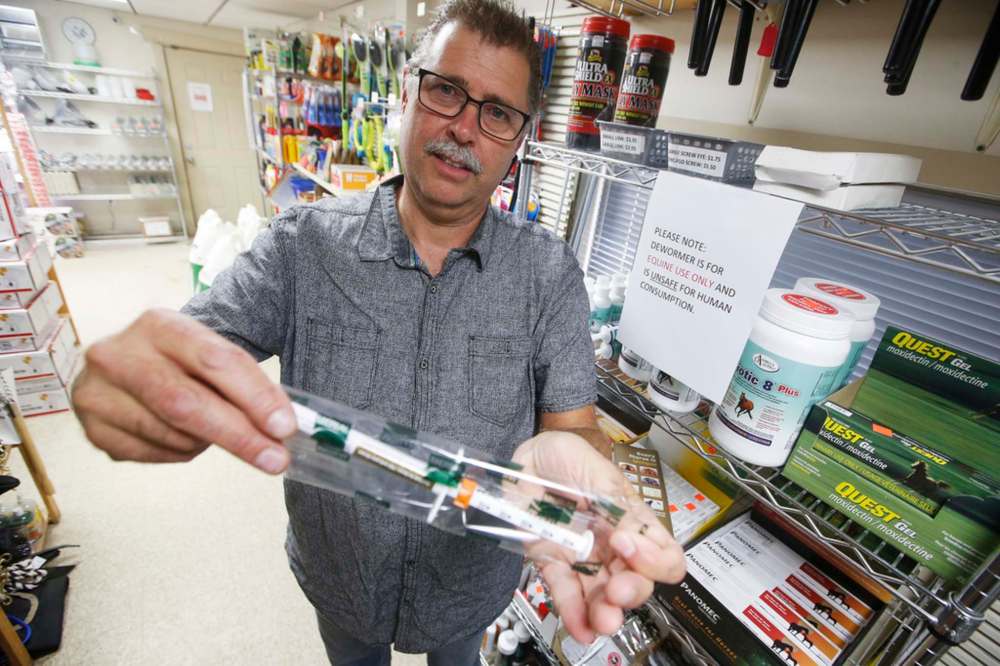
“It certainly raises concerns, because the medication is not intended for humans in the formulations we have,” said Chris Bell, a veterinarian at Elders Equine, which specializes in treatment for horses.
According to Health Canada, veterinary doses of the anti-parasitic can cause side-effects such as vomiting and diarrhea, and more severe reactions including seizures, comas or even death.
A man showed up at the Cartier vet clinic last week asking for ivermectin pills, Bell told the Free Press.
“That raises our ears,” he said Thursday, because ivermectin is typically in paste form for horses and is sometimes sold as a liquid injection for cattle.
The medication is typically used to treat intestinal worms in animals. It can be prescribed in anti-parasitic tablets for humans, but those are different from the doses given to livestock — and vets don’t stock them.
“It’s quite frankly surprising that vets are being involved in this.”
– Manitoba Veterinary Medical Association executive director Corey Wilson
Bell said other clinic staff encountered the man, who seemed to expect to purchase ivermectin pills, and asked him to leave the property. They notified local RCMP because the man was acting strangely, peering in the building’s windows. The man didn’t mention COVID-19, but Bell said it was likely the reason for the incident.
“The scenario certainly made me wonder if that was what was going on.”
Bell also raised concerns about the effects of ingesting a medication meant for large animals. If a horse overdoses on ivermectin, it can cause neurological problems.
It’s one of two incidents Manitoba vets have reported about individuals seeking to buy ivermectin.
In response, the Manitoba Veterinary Medical Association issued a statement: “Veterinary professionals in Manitoba have recently reported instances of members of the public requesting ivermectin for human use. Manitoba veterinary professionals do not give human health advice to the public and instead refer members of the public to their human health practitioners.”
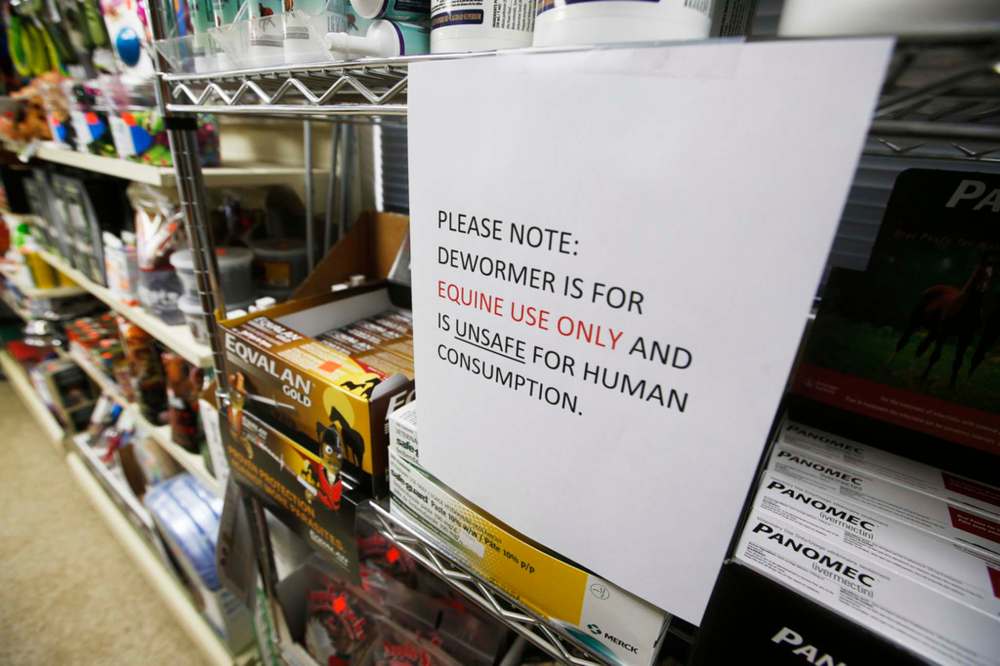
“It’s quite frankly surprising that vets are being involved in this,” association executive director Corey Wilson added in an interview.
Glenn Miller first heard the unproven claim the drug developed in the 1970s cures COVID-19 from one of his U.S. customers last year. The owner of Anola Feed and Farm Supply Ltd. said the misinformation has indeed made its way to Manitoba.
“I’m confused, I really am,” Miller said, explaining the anti-parasitic smells bad, and horses don’t like it. “It just confuses me that people are looking for agricultural products for human use.”
Miller has posted warning signs in his store, after staff started getting regular phone calls asking about ivermectin.
They get two or three inquiries a week, he said, and because they usually know the horse owners among the tight-knit customer base, staff have a pretty good idea when people are trying to buy it for something other than approved use.
It puts the business in a tough spot, Miller said. He doesn’t want to police the sale of an over-the-counter item — “That’s not my place” — but also doesn’t want people to ingest a drug meant for livestock.
Since speaking publicly about increased interest in ivermectin supply, Miller said he’s been contacted by someone upset Miller won’t promote it as a COVID-19 treatment. He said the store’s Facebook page has had a spike in web traffic.
No overdoses caused by ivermectin have been reported in Manitoba, a Shared Health spokesperson wrote in a statement.
“We cannot be certain how many patients have used this medication to treat COVID-19, but we know this is occurring. The Manitoba Poison Centre has not seen any increase in calls related to ivermectin exposure compared to previous years, and Health Links… has not received any calls related to this substance,” Shared Health said.
“We remind Manitobans that ivermectin has not been approved for treatment of COVID-19 by Health Canada, and factual information about COVID-19 should only be sought from reliable sources.”
katie.may@freepress.mb.ca
Twitter: @thatkatiemay

Katie May is a general-assignment reporter for the Free Press.
Our newsroom depends on a growing audience of readers to power our journalism. If you are not a paid reader, please consider becoming a subscriber.
Our newsroom depends on its audience of readers to power our journalism. Thank you for your support.

